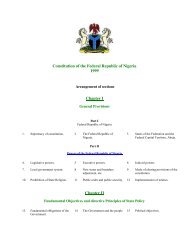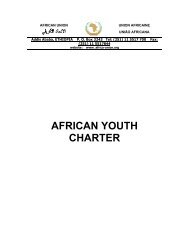Economic Recovery Growth Plan (ERGP) 2017-2020
This Medium Term Plan of the Federal Republic of Nigeria was designed to tackle the huge decline in the country’s economy since her shift from agriculture sector to crude oil and gas sector in the late 1960s. The plan’s objective includes restoring growth, investing in citizens and building a globally competitive economy.
This Medium Term Plan of the Federal Republic of Nigeria was designed to tackle the huge decline in the country’s economy since her shift from agriculture sector to crude oil and gas sector in the late 1960s. The plan’s objective includes restoring growth, investing in citizens and building a globally competitive economy.
You also want an ePaper? Increase the reach of your titles
YUMPU automatically turns print PDFs into web optimized ePapers that Google loves.
EXECUTIVE SUMMARY<br />
INTRODUCTION<br />
Nigeria has the potential to become a major player in the global economy by virtue of its human and<br />
natural resource endowments. However, this potential has remained relatively untapped over the years.<br />
After a shift from agriculture to crude oil and gas in the late 1960s, Nigeria’s growth has continued to be<br />
driven by consumption and high oil prices. Previous economic policies left the country ill-prepared for<br />
the recent collapse of crude oil prices and production. The structure of the economy remains highly<br />
import dependent, consumption driven and undiversified. Oil accounts for more than 95 per cent of<br />
exports and foreign exchange earnings while the manufacturing sector accounts for less than one percent<br />
of total exports. The high growth recorded during 2011-2015, which averaged 4.8 per cent per annum<br />
mainly driven by higher oil prices, was largely non-inclusive. Majority of Nigerians remain under the<br />
burden of poverty, inequality and unemployment. General economic performance was also seriously<br />
undermined by deplorable infrastructure, corruption and mismanagement of public finances. Decades of<br />
consumption and high oil price-driven growth led to an economy with a positive but jobless growth<br />
trajectory.<br />
After more than a decade of economic growth, the sharp and continuous decline in crude oil prices since<br />
mid-2014, along with a failure to diversify the sources of revenue and foreign exchange in the economy,<br />
led to a recession in the second quarter of 2016. The challenges in the oil sector, including sabotage of oil<br />
export terminals in the Niger Delta, negatively impacted government revenue and export earnings, as well<br />
as the fiscal capacity to prevent the economy from contracting. The capacity of government spending was<br />
equally constrained by lack of fiscal buffers to absorb the shock, as well as leakages of public resources<br />
due to corruption and inefficient spending in the recent past.<br />
The current administration recognizes that the economy is likely to remain on a path of steady and steep<br />
decline if nothing is done to change the trajectory. It is in this context that since inception in May 2015,<br />
Government has made several efforts aimed at tackling these challenges and changing the national<br />
economic trajectory in a fundamental way. The earliest action was the prioritization of three policy goals:<br />
tackling corruption, improving security and re-building the economy. Consequently, the Strategic<br />
Implementation <strong>Plan</strong> (SIP) for the 2016 Budget of Change was developed as a short-term intervention for<br />
this purpose. Visible successes and achievements have been recorded. However, it is recognized that more<br />
needs to be done to propel the country towards sustainable accelerated development.<br />
The <strong>Economic</strong> <strong>Recovery</strong> and <strong>Growth</strong> <strong>Plan</strong> (<strong>ERGP</strong>), a Medium Term <strong>Plan</strong> for <strong>2017</strong> – <strong>2020</strong>, builds on the<br />
SIP and has been developed for the purpose of restoring economic growth while leveraging the ingenuity<br />
and resilience of the Nigerian people – the nation’s most priceless assets. It is also articulated with the<br />
understanding that the role of government in the 21st century must evolve from that of being an omnibus<br />
provider of citizens’ needs into a force for eliminating the bottlenecks that impede innovation and marketbased<br />
solutions. The <strong>Plan</strong> also recognises the need to leverage Science, Technology and Innovation (STI)<br />
and build a knowledge-based economy. The <strong>ERGP</strong> is also consistent with the aspirations of the<br />
Sustainable Development Goals (SDGs) given that the initiatives address its three dimensions of<br />
economic, social and environmental sustainability issues.<br />
<strong>ERGP</strong>’S New Approach<br />
The <strong>ERGP</strong> differs from previous plans in several ways. First, focused implementation is at the core of the<br />
delivery strategy of the <strong>Plan</strong> over the next four years. More than ever before, there is a strong political<br />
determination, commitment and will at the highest level. Whilst all the MDAs will have their different<br />
roles in implementing the <strong>Plan</strong>, a Delivery Unit is being established in the Presidency to drive the<br />
implementation of key <strong>ERGP</strong> priorities. The Ministry of Budget and National <strong>Plan</strong>ning will coordinate<br />
plan-implementation and for this purpose will, amongst other things, build up its capability for robust<br />
monitoring and evaluation.<br />
Second, the <strong>Plan</strong> outlines bold new initiatives such as ramping up oil production to 2.5mbpd by <strong>2020</strong>,<br />
privatizing selected public enterprises/assets, and revamping local refineries to reduce petroleum product<br />
imports by 60 percent by 2018. Other initiatives include environmental restoration projects in the Niger<br />
10





